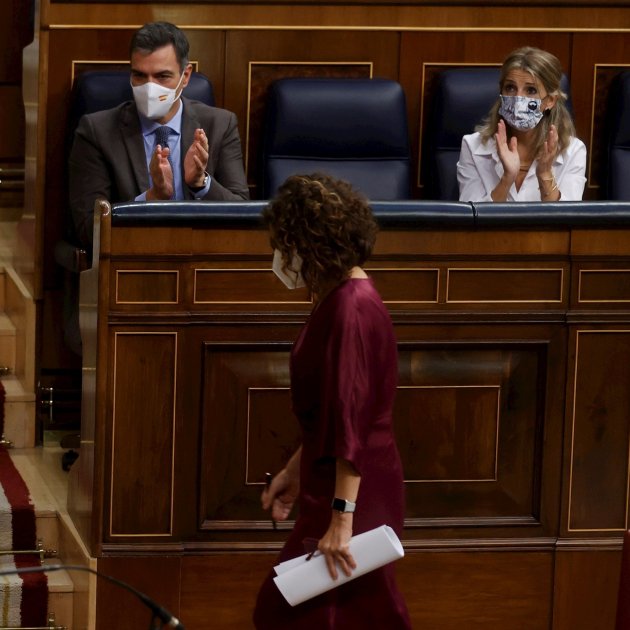A re-run of what happened last year. Spain's Congress of Deputies has given the green light to the government's budget for 2022, the second set of accounts under Pedro Sánchez, after last-minute agreements with the parties which had allowed his government to form at the start of 2020. Indeed, the same script as last time applied at Catalan level too: the pro-independence block has again split, with ERC and the PDeCAT in favour and Junts and the CUP against. The two Catalan government partners in the end went their separate ways, despite the need to coordinate in Madrid that was agreed when they formed their coalition in Barcelona. Issues such as the Catalan language and compliance with investment commitments in Catalonia were put on the table. The Spanish accounts will now be sent to the Senate for approval. No surprises are likely there and they are therefore likely to come into force on 1st January. Quite a boost for Pedro Sánchez as he faces the second half of the legislature.
The budget is expansive, thanks to the flexibility granted by Brussels and the European funds (40 billion euros in 2022), and the Sánchez executive speaks of it in terms of a "fair recovery". The new public accounts received 188 votes in favour, exactly the same as last year. The PSOE, Unidas Podemos, ERC, the PDeCAT, the PNV, EH Bildu, Més País, Compromís, Nueva Canarias, the PRC, Teruel Existe voted in favoru. The PP, Vox, Ciudadanos, Junts, the CUP, Navarra Suma and Coalición Canaria went the opposite way. The single BNG deputy from Galicia abstained.
The language issue was central, coinciding with the attacks on the system of educational immersion in Catalan. ERC (Catalan Republican Left) began its negotiations agreeing to establish the terms of the future state audiovisual law, and ended up complying with its promise: it obtained a quota of 6% of the total catalogue content on streaming platforms which is to be in Catalan, Basque or Galician. It also successfully negotiated, alongside the Basques of EH Bildu and the Galician BNG, a fund of 10.5 million euros for audiovisual productions in Spain's co-official languages. ERC also eked out an agreement on raising investment in Catalonia from the initial 17.2% to 19% as established by the third additional provision of the Catalan Statute of Autonomy and the resolution of enforcement problems. However, the party did not convince Pedro Sánchez to transfer the Via Laietana police station to Catalan control for conversion into a memorial space, although they did withdraw the investment in improvements to the building that had been planned for next year. For its part, the PDeCAT (Catalan European Democratic Party) obtained state agreement for its proposal that non-profit organizations providing social services or cooperating with public health will be able to receive money from the EU's Next Generation funds.
The story was very different for Junts (Together for Catalonia). The only thing it achieved, a Covid fund, was passed with the the Spanish government voting against, having attempted to veto it and warning when it failed that it will not execute the plan. The Catalan party started the process with a different attitude but found theire tactics faced a brick wall. On Wednesday, Junts spokesperson Míriam Nogueras confirmed her party's 'no', saying that the pactism of the PSOE was mere "smoke". And she sent a warning to the whole of the independence movement, especially to Junts's partners in the Generalitat government: "We are slipping back and we cannot afford to make another mistake."
From the outset, the CUP (Popular Unity Candidature) had refused to sit down with the Spanish presidency minister, Félix Bolaños, to establish negotiations. The far-left party said repeatedly that the conditions for doing so were not met because the Spanish government was not proposing sufficiently "brave" policies, either in the social sphere or the resolution of the political conflict with Catalonia.
Basques united
By contrast with the four Catalan independence parties, the two Basque nationalist parties did manage to follow a common line: both EH Bildu and the PNV voted in favour, with the former obtaining agreement on measures of social protection that will enter law - such as the prohibition of evictions without a housing alternative or the postponement of rent payment for people in a situation of vulnerability. The Basque Nationalists, on the other hand, are still to finalise their agreement on the budget, ahead of the debate in the Senate. But they still voted yes in Congress.
